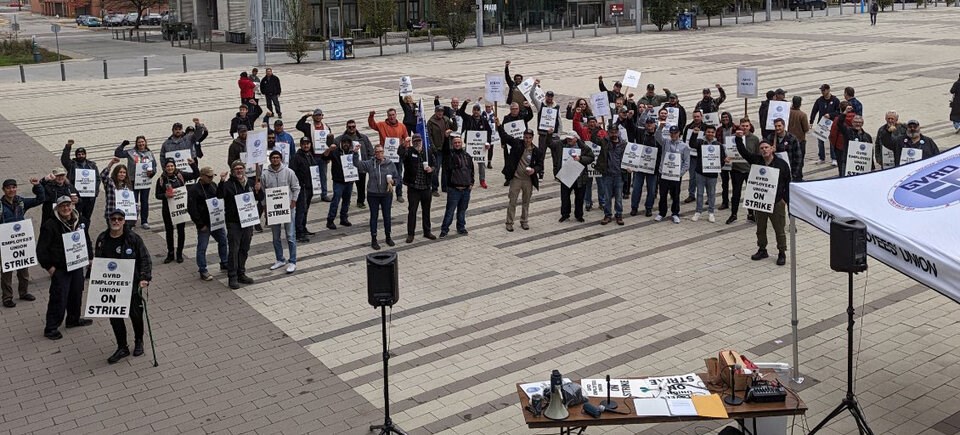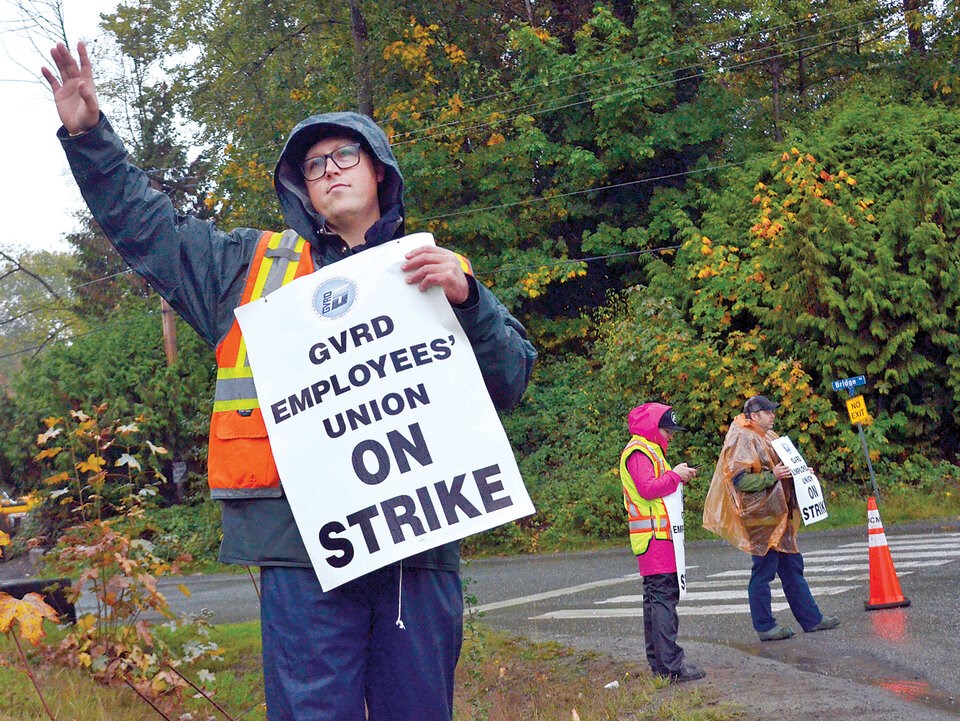Roughly 670 Metro Vancouver wastewater plant workers have gone on strike after ongoing wage negotiations broke down over the weekend.
The bargaining committee for the Greater Vancouver Regional District Employees' Union (GVRDEU) said they went into negotiations Friday with “momentum.”
“Unfortunately, talks broke off as it became evident that the employer was not willing to provide us with the parity we seek compared to other member municipalities,” they wrote in an Oct. 22 letter to members.
The union set up picket lines at the Jervis pump station and at Surrey City Hall Saturday, where the Metro Vancouver’s Council of Councils was scheduled to meet. Dozens of members turned up at the pickets lines, alongside Rob Ashton, president of the International Longshore and Warehouse Union Canada.
“The struggle that the GVRDEU is in right now with Metro Vancouver isn’t just a struggle for union and your rank and file,” Ashton told the crowd.
“This is an ongoing struggle of the working class in this province and in this country. It’s where the rich get richer, and the working class suffers.”
The union says Metro Vancouver postponed its meeting.
On Monday morning, the union set up picket lines at four Metro facilities in North Vancouver and and New Westminster.

The union members are responsible for a number of “critical roles” at Metro Vancouver's wastewater facilities. They include tradesmen, technologists, and power engineers, who together operate and maintain water treatment, distribution and disinfection facilities. They also handle watershed management and security, and hold roles in affordable housing, regional parks, infrastructure construction projects, and air quality monitoring.
Negotiations kicked off after the union’s last contract expired Dec. 31, 2021.
In an email, Metro Vancouver’s general manager of external relations Sandra Jansen told Glacier Media the ongoing job action won't impact essential services the body provides to almost 2.8 million residents.
“Metro Vancouver is using qualified, competent exempt staff to perform struck work,” Jansen said.
Metro Vancouver is a federation of 21 municipalities, one electoral area, and one treaty First Nation that delivers regional-scale public services. It operates the region's three reservoirs, several waste collection facilities, and manages regional sewer and park networks, among other services.
Jansen said Metro is “committed to reaching a fair and reasonable collective agreement that meets or exceeds recently ratified settlements within the region.”
“The current economic climate is challenging for everyone — we value our staff and local taxpayers who must pay for any agreement we reach,” she said.
According to Jansen, Metro Vancouver has offered an 11.5 per cent wage increase over three years, a one-time lump sum payment of 4.5 per cent of 2022 wages, and “additional improvements to allowances and benefits.”
“To be clear, we are no longer seeking any concessions, including a previous request to once again waive what’s being referred to as a ‘me too’ or ‘fair wage’ clause — this is a wage parity provision that ties GVRDEU compensation to agreements reached between the City of Vancouver and CUPE 1004,” she said.
“Despite the union abruptly walking out of bargaining on Friday to resume picketing, we remain committed to continuing negotiations at the earliest opportunity.”
Union president Jesse Medeiros was not immediately available for comment.




